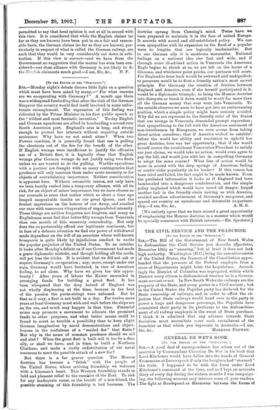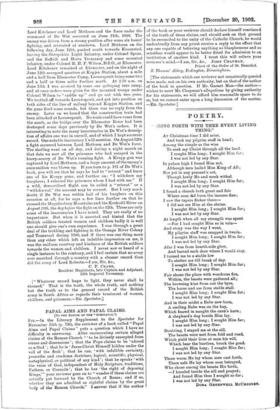GENERAL DE WET'S BOOK.
[TO THE EDITOR OP THE " SP ECTATOR.1
SIR,—A good deal of correspondence has arisen out of the assertion by Commandant Christian De Wet in his book that Lord Kitchener would have fallen into the hands of General Fronemann at Leeuwspruit if only the burghers had "stormed" the train. I happened to be with the force under Lord Kitchener's command at the time, and as I kept an accurate diary of every day during the sixteen months I was campaign- ing, the following account may interest some of your readers. The fight at Roodepoort or Rhenoster between the forces of
Lord Kitchener and Lord Methuen and the force under the command of De Wet occurred on June 11th, 1900. The enemy was driven from a strong position after some six hours' fighting, and retreated at sundown. Lord Methuen on the following day, June 12th, pushed south towards Kroonstad, leaving the Shropshire Light Infantry, under Colonel Spens, and the Suffolk and Herta Yeomanry and some mounted infantry, under Colonel R. H. F. Wilson, D.S.O., at Rhenoster. Lord Kitchener remained at Rhenoster, and on the night of June 12th occupied quarters at Kopjes Station, about a mile and a half from Rhenoster Camp, Leeuwspruit being some two and a half or three miles further north. At 2.30 a.m. on June 13th I was aroused by some one galloping into camp,
and at once orders were given for the mounted troops under Colonel Wilson to " saddle up " and go out with two guns. We trotted off towards Leeurvapruit, and got into position on both sides of the line of railway beyond Kopjes Station, and the guns fired some rounds, but there was no reply from the enemy. Later on we heard that the construction train had been attacked at Leeuwspruit. No train could have come from the south, as the bridge over the Rhenoster River had been destroyed some days previously by De Wet's orders. It is interesting to note the many inaccuracies in De Wet's descrip- tion of affairs one was in oneself, and of which I kept accurate record. One notable inaccuracy I will mention. On Augustl2th a fight occurred between Lord Methuen and De Wet's force. The shelling went on all day, and during a night march on that date we met all the prisoners who had escaped in the hurry-scurry of De Wet's running fight. A Krupp gun was captured by Lord Methuen, and a large amount of the enemy's ammunition was blown up. If you turn to p. 181 of De Wet's book, you will see that he says he had to "retreat" and leave one of his Krupp guns, and further on : "I withdrew my burghers; I released the prisoners whom I had with me." If a wild, demoralised flight can be called a " retreat" or a "withdrawal," the account may be correct. But I very much doubt if De Wet was within hail of his burghers on this occasion at all, for he says a few lines further on that he crossed the Magaliesberg Mountains and the Krokodil River on August 11th, the day before the fight on the 12th. These are only some of the inaccuracies I have noted. They are really of no importance. But when it is asserted and hinted that the British soldiers treated women and children badly it is well one should give one's own experience. I was through a great deal of the trekking and fighting in the Orange River Colony and Transvaal during 1900, and if there was one thing more than any other which left an indelible impression on me, it was the uniform courtesy and kindness of the British soldiers towards the women and children. I never saw or heard of a single instance to the contrary, and I feel certain that no army ever marched through a country with a cleaner record than did the army of Lord Roberts.—I am, Sir, &c.,
C. P. CRANE, Resident Magistrate, late Captain and Adjutant, 12th Imperial Yeomanry.
[" Whatever record leaps to light, they never shall be shamed." That is the truth, the whole truth, and nothing but the truth as to the general record of the British army in South Africa as regards their treatment of women, children, and prisoners.—ED. Spectator.]











































 Previous page
Previous page